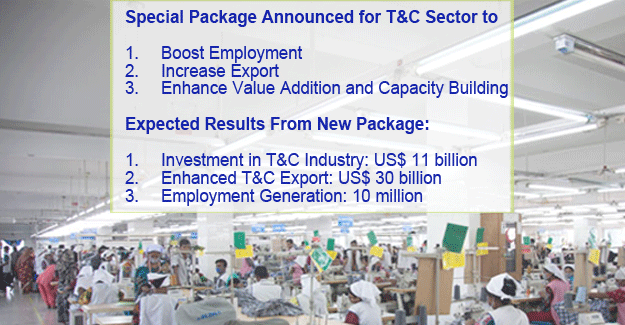
Indian Textile and Clothing Industry Gets A New Lease Of Life
Special Package Announced for Textile & Clothing Sector to
1. Boost Employment
2. Increase Export
3. Enhance Value Addition and Capacity Building
Expected Results From New Package:
1. Investment in T&C Industry: US$ 11 billion
2. Enhanced T&C Export: US$ 30 billion
3. Employment Generation: 10 million
India’s Union Government has unveiled a package of reforms for textile and clothing industry which is approved by Cabinet Committee headed by Prime Minister Narendra Modi.
The package includes measures which would generate millions of jobs, enhance economies of scale of the industry, promote export and are labour friendly. Government sources claim that the new initiatives would generate 10 million jobs in the textile and clothing Industry over next 3 years. The steps are also expected to result in an increase of exports by US$ 30 billion and stimulate investment of Rs. 74,000 crores (US$ 11 Billion) over next 3 years.
The majority of new jobs are likely to go to women since the garment industry employs nearly 70% women workforce. Thus, the package would help in social transformation through women empowerment. Salient features of the package announced are:
Additional incentives under ATUFS
The new package breaks new ground in moving from input to outcome based incentives by increasing subsidy under Amended – Technology Upgradation Fund Scheme (A-TUFS) from 15% to 25% for the garment sector as a boost to employment generation. This is also made mandatory that disbursement of the capital subsidy would be done only after the expected jobs are created.
Enhanced duty drawback coverage
In a unique move, government is going to introduce a new scheme which would refund the state taxes on goods in case of exports. Such levies were not refunded so far and this move is expected to boost the competitiveness of Indian exports. While this scheme would cost the government exchequer Rs 5500 crores (US$ 800 million approximately) but will greatly assist in exploring foreign markets. Also, drawback at All Industries Rate to be given for domestic duty paid inputs even when fabrics are imported under Advance Authorization Scheme.
Employee Provident Fund scheme reforms
Union Government shall bear the entire 12% of the employers’ contribution to the Employers Provident Fund (EPF) Scheme for new employees of garment industry for first 3 years for the employees earning less than Rs. 15,000 per month (approximately US$ 223 at current exchange rate). Currently, 8.33% of employer’s contribution is already being provided by the government under Pradhan Mantri Rozgar Protsahan Yojana (PMRPY). The additional 3.67% employer’s contribution amounting to Rs. 1,170 crores (approx. US$ 174 million) shall be provided by the Ministry of Textiles over next 3 years.
Additionally, EPF scheme is made optional for employees earning less than Rs. 15,000 per month and those who does not want to contribute to it and therefore get more take home pay.
Increasing overtime caps
Overtime hours for factory workers not to exceed 8 hours per week in line with ILO norms and this would lead to increased earnings for the workers.
Introduction of fixed term employment
Considering the seasonal nature of the textile and clothing industry, fixed term employment shall be introduced for the garment sector. A fixed term workman shall be considered at par with permanent workman in terms of working hours, wages, allowanced and other statutory dues.
Enhanced scope of Section 80JJAA of Income Tax Act
Further to the amendments made in the Section 80JJAA of Income Tax Act in the FY 2016-17, for the garment industry, the provision of 240 minimum numbers of days of employment in a year, has been relaxed to 150 days looking at the seasonal nature of industry. This would benefit the garment companies and boost the objective of generating employment opportunities in the industry.
Textile Excellence
If you wish to Subscribe to Textile Excellence Print Edition, kindly fill in the below form and we shall get back to you with details.












